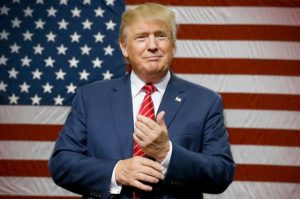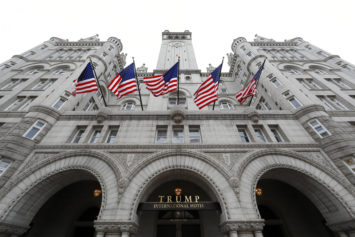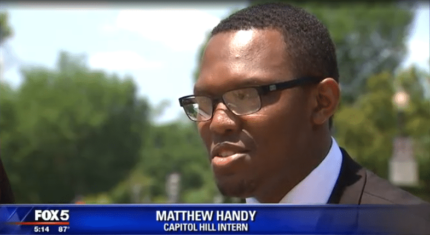
President-elect Donald Trump. Photo by AP/LM Otero.
In the weeks following Donald Trump’s stunning victory in the 2016 presidential election, critics of the real estate tycoon-turned-politician have continuously called him out on a number of conflicts of interest spurred by his reluctance to separate the Trump family brand from his new role as president of the United States.
“I will be leaving my business in total in order to fully focus on running the country in order to MAKE AMERICA GREAT AGAIN!,” Trump wrote of his multiple international real estate dealings in a tweet Wednesday. “While I’m not mandated to do this under the law, I feel it is visually important, as president, to no way have a conflict of interest with my various business dealings.”
While the president-elect says he’ll totally step away from his family businesses, recent photos of him and eldest daughter Ivanka sitting in on meetings with foreign leaders and of him speaking with Indian real estate partners have people questioning whether The Donald can truly keep the family brand from permeating his duties as president.
According to The Guardian, the most immediate conflict in the bunch is his newly built Trump International Hotel in Washington, D.C., which stands less than a mile from the White House. Cause for trouble exists there, as the property is a federal building leased by the Trump Organization in 2013, but the lease clearly prohibits any “elected official of the Government of the United States” from holding “any share of part of this Lease.”
Moreover, president-elect Trump is responsible for appointing the head of the General Services Administration — the same agency tasked with negotiating the lease for Trump’s D.C. hotel.
Experts have advised the GSA to break its lease with the Trump Organization, preferably before Inauguration Day, in case the president-elect fails to resolve these issues in a timely fashion.
The U.S.Department of Justice could also throw a monkey wrench in Trump’s multi-billion dollar business dealings with Deutsche Bank. In September, the DOJ ordered the German lender to shell out roughly $14 billion for reportedly selling risky mortgage-backed bonds, which led to the 2008 financial crisis. The Guardian reported that the bank was prepared to pay $2 $billion-3 billion but balked at the DOJ’s hefty fine. Now, negotiations to talk the price down are expected to continue as Trump works to establish his administration.
Ironically, Deutsche Bank is also one of the Trump Organization’s biggest lenders. It has “participated in loans of at least $2.5 billion to companies affiliated with Mr. Trump,” along with another $1 billion in “loan commitments” to Trump affiliates, according to The Wall Street Journal.
Trump’s new role as president-elect could further complicate things, as he’s responsible for overseeing the Justice Department and appointing the nation’s next attorney general. That attorney general would then be tasked with handling the Deutsche negotiations.
Moreover, there’s the conflict of interest surrounding Trump and the profits he’d make off his Secret Service detail. Earlier this year, Trump announced that his wife Melania and their young son Barron would continue residing in Trump Tower in New York City for a portion of his term. The fact that he and his family would stay in a Trump-owned property and fly in Trump-owned jets means that Secret Service agents tasked with securing his family would be required to pay rent and airfare.
According to The Atlantic, the Secret Service, which typically pays its own way for travel during elections, spent $2.74 million just to fly on a jet owned by one of Trump’s many companies. NBC News reported that the New York Police Department also is handling external security at Trump Tower at an estimated cost of $1 million per day, which costs taxpayers nearly $2 million a day.
“You put a price tag on anything around the president, then you’re putting a price tag on his life and that is priceless,” Jonathan Wackrow, a former Secret Service agent, told NBC News in an exclusive interview.
Trump’s international dealings with companies in Saudi Arabia, his Indian business partners and his links to brash Philippines president Rodrigo Duterte also present major conflicts of interest for the U.S. Still, the president-elect insisted that completely stepping away from his business interests, both domestic and foreign, would ensure that his family brand would have no influence in his presidency.
Not everyone is convinced, however.
In the wake of Trump’s election victory, top ethics lawyers for both George W. Bush and President Barack Obama urged the Electoral College not to make Trump president unless he agreed to sell off his companies and put them in a blind trust, ThinkProgress reported. For them, that would be the sure-fire way to keep the president-elect’s business interests from conflicting with U.S. political interests.
“I don’t think the Electoral College can vote for someone to become president if he’s going to be in violation of the Constitution on Day One and hasn’t assured us he’s not in violation,” said Richard Painter, Bush’s Chief Ethics Counsel, during a recent appearance on CNN.
According to a tweet sent Wednesday, Trump is expected to hold a press conference on Dec. 15 to announce exactly how he plans to resolve these conflicts of interest.
I will be holding a major news conference in New York City with my children on December 15 to discuss the fact that I will be leaving my …
— Donald J. Trump (@realDonaldTrump) November 30, 2016

